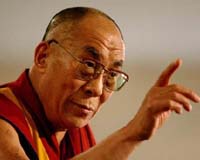 |
New Delhi (UPI) Nov 9, 2009 India is welcoming the Dalai Lama to the country's disputed north eastern territory, despite China's vehement opposition to the Buddhist spiritual leader's visit. China and Indian fought a brief inconclusive war in 1962 over the area in Arunachal Pradesh on the China-India border and the two countries have agreed to differ rather than harm their greater bilateral relations. However, the weeklong visit of the Dalai Lama to the area has been condemned by Beijing as being insensitive to China's problems with its internal separatist movements, especially in Tibet where the Chinese claim the exiled leader is fomenting uprisings. India's former national security adviser Brajesh Mishra said in an interview with the Hindustan Times that India is standing firm in the face of heavy Chinese criticism. "India has done what it has been doing in the past," Mishra is quoted as saying. "The Chinese are asserting their position. Our stated position is that as long as the Dalai Lama does not involve himself in political activity, he is free to visit any part of the country he wants." Former Foreign Secretary Muchkund Dubey said neither the Chinese nor anyone else should "get so excited over it." Arunachal Pradesh is an integral part of India and "the Dalai Lama was our honored guest and free to move anywhere in the country." At stake is around 40,000 square miles of land that China claims is occupied by India. In turn, India believes that China has control over 15,000 square miles of its territory. At the heart of it all is Tawang, a picturesque mountaintop town of 20,000 overlooked by its 400-year-old Buddhist monastery. Most the people in Tawang and the district are ethnic Tibetans. But the Dalai Lama, 74, has repeatedly stressed his visit is non-political. Thousands of monks and lay people greeted the leader who was last in the region six years ago, although he first saw the area in 1959 when he passed through while fleeing Tibet after the Chinese army took control of the country. He denied Chinese claims that he was inciting Tibetans to rise up against the Chinese, Indian media reported Sunday on the first day of his visit. His visit was only "emotional" because Tawang has strong ties to Tibet, said the 1989 Nobel Peace Prize laureate. "It is totally baseless on the part of the Chinese Communist government to say that I am encouraging a separatist movement," the Press Trust of India reported him saying. "My visit to Tawang is non-political and aimed at promoting universal brotherhood and nothing else." Last week a Chinese Foreign Ministry spokesman told the Chinese national Xinhua news agency that China opposes the visit. "China's stance on the eastern section of the China-India border is consistent and we firmly oppose the Dalai Lama's visit to the region," said Ma Zhaoxu at a news briefing. "This further exposes the Dalai clique's anti-China and separatist nature," said Ma. He accused the Dalai Lama of lying and being engaged in damaging relations between China and other countries, but his attempt "will not succeed," Xinhua reported Ma said recent talks between Chinese Premier Wen Jiabao and Indian Prime Minister Manmohan Singh ended with an agreement to push forward bilateral ties in a healthy and stable manner, which "is the consensus of the people of the two countries." The globe-trotting Dalai Lama, while insisting his visits are non-political, often takes time to urge governments to stop fighting their wars and to sit down at negotiating tables to resolve disputes. Along with this he has often called for governments to give more freedom to their people. During a visit to Japan at the end of October, he "strongly appealed to the international community and especially to the media to go to China and Tibet and investigate the reality of the situation," according to his official Web site. "If you find out that what China's government is saying about Tibet is correct, then I will cease all my activities and apologize to them," he told journalists are the Foreign Correspondent's Club of Japan. He praised Chinese President Hu Jintao for building a harmonious society but said harmony cannot come from the guns of the Chinese army, only from trust and faith. The more than 1 billion people of China have the right to correct information and not just communist propaganda, he said. Share This Article With Planet Earth
Related Links China News from SinoDaily.com
 Dalai Lama draws huge crowds on visit slammed by China
Dalai Lama draws huge crowds on visit slammed by ChinaTawang, India (AFP) Nov 9, 2009 Tens of thousands of Buddhist devotees gathered Monday to hear the Dalai Lama on his visit to a Tibetan border region that he insists is "non-political" but which China views as deeply provocative. Some 30,000 people, many of whom had arrived days in advance, were expected to attend a mass session of religious teaching by the exiled Tibetan spiritual leader at the remote Tawang monastery in ... read more |
|
| The content herein, unless otherwise known to be public domain, are Copyright 1995-2009 - SpaceDaily. AFP and UPI Wire Stories are copyright Agence France-Presse and United Press International. ESA Portal Reports are copyright European Space Agency. All NASA sourced material is public domain. Additional copyrights may apply in whole or part to other bona fide parties. Advertising does not imply endorsement,agreement or approval of any opinions, statements or information provided by SpaceDaily on any Web page published or hosted by SpaceDaily. Privacy Statement |